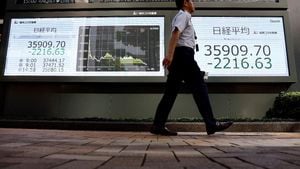PepsiCo is the latest company to retreat from its diversity, equity, and inclusion (DEI) initiatives, according to a memo CEO Ramon Laguarta sent to associates. The memo, shared by conservative social media activist Robby Starbuck on X and confirmed to be accurate by the company, revealed significant policy changes as PepsiCo nears the end of its five-year DEI strategy by 2025.
"We see an even bigger opportunity to more deeply embed inclusion throughout the business as a key driver of business growth and will be introducing a new Inclusion for Growth strategy," Laguarta wrote. This strategy marks the company's shift away from targeted DEI roles, eliminating the chief DEI officer position. Instead, the responsibilities will merge with broader roles focused on employee engagement, leadership development, and promoting the A Space to Be You initiative.
Monica Bauer Mengelberg, recently appointed chief global diversity, equity, and inclusion officer, will transition to focus on employee engagement, as noted by her Linked-in announcement. Mengelberg previously held the position of global employee engagement senior vice president and recently received the Diversity, Equity, and Inclusion Person of the Year Award from the Hispanic PR Association.
The memo also stated PepsiCo would broaden its supplier diversity strategy to include small businesses, mirroring similar moves by other retailers like Target, which also recently altered its supplier diversity team to focus on supplier engagement. PepsiCo will now measure partnerships based on their contribution to overall business growth rather than demographic categories.
Further, the company announced it would discontinue “single demographic category surveys,” illustrating its pivot from specific goal-setting for minority representation within managerial roles and supplier bases. Previously branded as mandatory DEI initiatives, these changes are part of broader corporate shifts occurring across various industries.
Bloomberg recently reported the intentions of Coca-Cola and PepsiCo to curtail their DEI policies, particularly since both companies sell their products at government facilities. NPR highlighted earlier this month how PepsiCo had removed DEI language from its investor reports, signaling substantial strategic realignment.
While PepsiCo steps back from specific DEI commitments, Coca-Cola has vocalized its steadfast dedication to such efforts. Its recent annual report emphasized, "Failure to maintain a corporate culture ... could disrupt our operations and adversely affect our business and our future success." Coca-Cola has consistently set ambitious representation goals, seeking to achieve women holding 50 percent of its senior leadership roles by 2030 and ensuring racial and ethnic diversity across its corporate structure.
Robby Starbuck, who has been vocal against corporate DEI initiatives, expressed approval of PepsiCo’s approach, stating on X, "Coca-Cola should be very nervous about continuing with their woke policies." Starbuck’s commentary reflects broader sentiments among conservatives who argue against the perceived excesses of DEI initiatives.
Concern over DEI strategies has been heightened since the election of President Donald Trump, which led many organizations to reevaluate such policies. Trump ended federal DEI programs and has cautioned educational institutions against maintaining similar frameworks, asserting consequences related to federal funding.
The concerted retreat from DEI practices is also echoed by other major retail companies including Target, Walmart, and Lowe’s, which have either scaled back these initiatives or redirected their focus. By juxtaposition, companies like Costco, Pinterest, and E.l.f. Beauty continue to uphold their DEI objectives, emphasizing the diverging paths within corporate America.
PepsiCo's strategic shift raises questions about the long-term impacts on inclusivity within the corporate sphere. With investment and focus turning away from mandatory DEI frameworks, the culture of inclusion may face re-evaluation as business priorities take precedence over social imperatives.
Industry analysts ponder the repercussions these changes might hold for PepsiCo and its competitors as they navigate these complex waters. Consumers are increasingly favoring brands perceived as socially responsible, making it plausible for corporations to face consumer backlash if inclusivity is deprioritized, potentially impacting reputation and brand loyalty.
PepsiCo's changes come at defining moments for other corporations, aligning with broader political and social landscapes impacting business environments across the nation. The collective movements of companies to recalibrate DEI initiatives warrant discussions around the efficacy and future of these programs, implicatively underscoring the continuous dialogue surrounding equity and inclusion.
PepsiCo's actions effectively mark a significant moment of reckoning for corporate responsibility toward diversity and inclusivity, posing strategic questions for the future.



